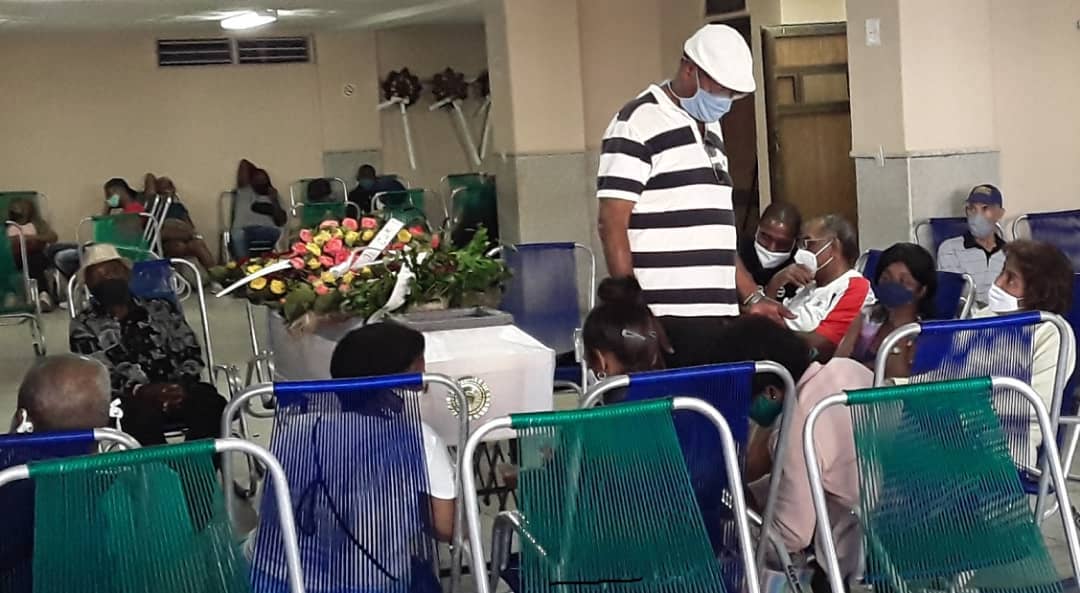The health disaster in the province of Santiago de Cuba related to the Covid-19 pandemic has swamped hospitals and morgues, while authorities continue to report few deaths from the pandemic.
During a tour of the second most important city on the island, DIARIO DE CUBA found that, in the student dorms of the Universidad de Oriente, outfitted for personnel leaving the "red zones", one doctor died, and 20 others are ill, without this information ever being published in the daily reports offered by the Ministry of Public Health.
Also shrouded in secrecy is the death of a worker on the IV line at the Laboratorio Farmacéutico de Oriente who participated in the first stage of the clinical trial for the Abdala vaccine, developed by the Center for Genetic Engineering and Biotechnology (Centro de Ingeniería Genética y Biotecnología).
The work crew that was in direct contact with the deceased is in quarantine, and uncertainty is growing among those "chosen" to participate in the second phase of the project, who basically belong to this facility, one of those in charge of validating the injectable prototype.
At the Granjita de Siboney youth camp, designed for dengue victims, another woman died after allegedly testing positive for Covid-19, infecting 15 children, and receiving the wrong treatment.
Yaitelín, one of the mothers, said that her daughter "was urgently admitted to the therapy room because she had a reaction to the interferons." Days later she learned that "it was all a mistake and she was a victim of the perfunctory way in which health protocols are applied to stop the chains spreading the virus."
On the evening of 30 January, DIARIO DE CUBA confirmed that autopsies are not being carried out at the Saturnino Lora Provincial Hospital, nor is the cremation of corpses authorized because the local crematorium is overwhelmed.
"The situation with the deaths is chaotic."
At the stroke of 1:00 a.m. on 31 January, an employee of the Bartolomé Masó funeral parlor acknowledged with absolute nonchalance that "the situation with the deaths is chaotic, as up to two coffins have to be placed in each room to be able to handle all the wakes."
"That's not counting the dead from the pandemic," she said, showing a list of ten deceased at the Ambrosio Grillo Hospital and 23 at the Juan Bruno Zayas Hospital, who are "waiting to be cremated."
"We have to prioritize them because we don’t have the capacity to keep them, and they can spread the disease," he said.
Faced with the complaints and criticism by one of the mourners, another worker explained: "We’re not responsible. Like you, we resent the deception."
"Those who die of coronavirus are cremated along with their belongings, and at the moment the remains are not being returned to the relatives. Only watches, mobile phones and very few items of clothing are returned after disinfection," she said.
The situation in hospitals and morgues clashes with the low numbers of deaths from Covid-19 reported by the government. The disrespect with which the authorities are lying undercuts their credibility and harms everyone, especially Cuba’s public health system.
Workers at the Santa Ifigenia Cemetery stated that they had never seen such a large number of deaths, to the point that, due to lack of space in the vaults and collective niches, in January burials had to be diverted to the villages of El Caney, El Cristo and El Cobre.
On the afternoon of 1 February, around 60 patients with positive rapid tests remained at the ERs of the Ramón López Peña polyclinics in the Chicharrones district and at the José Martí polyclinic in the complex of multi-family buildings of the same name, due to a lack of capacity in the territory’s 26 isolation centers.
Many had been waiting for up to three days, while others, such as octogenarian Manuel Torres Quintana, who has a pacemaker and chronic obstructive pulmonary disease (aka COPD), were told in the early hours of the morning to walk home and wait for the ambulance.
As a result of overcrowding, those infected mingled with family and friends who went to health centers for PCR tests. Because they were asymptomatic, however, they could not get them. Some resorted to lying about their symptoms.
By the end of January all the overdue PCR requests in Santiago de Cuba had been refused, and it was never reported that 22 Medical Sciences students contracted the disease during the survey.
In the last ten days the territory has had 1,239 positive patients. Of these, about 70 have persistent PCRs, which points to the presence of a stronger strain.
According to the authorities, 79 children are receiving care at the Infantil Norte, including a 13-year-old reported to be in serious condition. That facility is a "fortress", after the death of a minor was leaked, which the MINSAP denies.
Hundreds of blocks remain shut down in Santiago de Cuba, where around 400 outbreaks are still active, preventing the spread of the disease and keeping isolation centers overwhelmed.
Although Miguel Díaz-Canel promised to reduce wait times for PCR results, they are still taking more than 100 hours.
Lack of hygiene is another aspect of the epidemiological crisis in the province, which will soon open the Versalles, San Juan, Las Américas and Costa Morena hotels to attend to tourists - while Cubans will be relegated to the baseball training facility and other places where water supply cycles take more than ten days.
